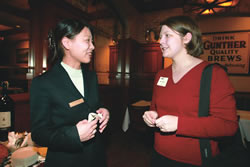 |
 |
 |
||||
 |
|
“It’s important that Oberlin students stand up and take leadership positions in all aspects of our society,” she argues. “In business, you can act as a conscience during product development or when the company is making its marketing plans. You can encourage companies to become involved in their local communities.” Besides, she says, she’d like to see the business world become more representative of the world at large—a world she saw reflected in the Oberlin Business Scholars who bunked at her New Jersey home in January. “There was a young woman from Vietnam, a young man from Ghana, and two football players—one was African American and one was a white Mormon,” Wagner recalls. “Where but at Oberlin would you get a mix like that? I find myself sitting in meetings all the time whose participants are predominantly white and male, and I know there’s a value in having different perspectives. I see that kind of diversity in action on the executive board of the Oberlin Alumni Association, and it’s incredibly powerful when you look at issues and try to come up with solutions.” And just as Oberlin and other liberal arts grads take their diversity into the business world, they also take their idealism—and sometimes find a way to use their newfound business smarts to advance their liberal agenda. Take Kamal Quadir ’96, who joined energy giant Occidental after graduation. As an Occidental employee, he returned to his native Bangladesh, where only 15 percent of the population lives with electricity, despite the country’s having more than 50 years of natural gas reserves. His old acquaintances were shocked that an Oberlin grad who once reveled in the art of painting and silkscreen would turn to the corporate world; a few accused him of selling out.
“That was a grossly wrong judgment,” Quadir says. “I needed to work in an energy company to help solve a huge problem: 85 percent of the people in Bangladesh do not have electricity. Energy companies are known for bad practices, but if you work for one, then you’re helping to change that. If you keep your core values intact, the best way to change the corporation is to work in the corporation.” Now an MBA candidate at the MIT Sloan School of Management, Quadir is looking toward a future in venture capital or private equity; he’s also taken his business skills outside the corporation. While in Bangladesh, Quadir observed a tremendous number of unemployed and underemployed artists. Recognizing that a huge demand for animation existed back in the U.S.—along with the realization that digitized art can be sent anywhere in a flash—he raised funds to create a company called Globekids Digital, which now employs 70 artists in Bangladesh. “It’s a perfect mesh,” says Quadir, who sits on the company’s board. “It creates jobs for the artists in Bangladesh and provides low-price, high-quality animation for American children.” After finishing business school, Quadir says, he’ll continue to look for other such entrepreneurial opportunities in the emerging world. Not only may they prove profitable for him, but they may also crack open local economies and give local people the chance to have good careers in the global marketplace. Next Page >> |
